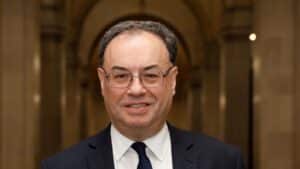The Bank of England is on the cusp of reducing interest rates for the first time in more than four years, bringing them down from a 16-year high of 5.25 per cent.
This crucial decision, anticipated at midday on Thursday, will be determined by the nine-member Monetary Policy Committee (MPC). A cut in borrowing costs would offer relief to homeowners and families grappling with the high cost of living.
City investors predict a tight vote among the MPC members, with Governor Andrew Bailey potentially casting the deciding vote if the committee is split. Current market sentiment suggests a more than 60 per cent chance of a rate cut this Thursday.
However, persistent domestic inflation might compel the MPC to maintain the current rate for the eighth consecutive meeting. In June, services inflation held steady at 5.7 per cent, surpassing the Bank’s forecasts, with wage growth also remaining high at the same rate.
The headline consumer price index inflation has remained at the Bank’s 2 per cent target for the past two months, sparking speculation about a possible easing of monetary policy for the first time since March 2020.
Goldman Sachs analysts foresee a 5-4 vote in favour of a rate cut, citing “significant progress on curbing inflationary pressures” in recent economic data. Nomura’s experts concur but describe the decision as “finely balanced”.
In the June meeting, some MPC members inclined towards holding rates indicated they were close to voting for a cut, fuelling predictions of a potential reduction in the upcoming August meeting.
The identification of MPC members likely to shift towards a rate cut has been challenging, especially with the Bank of England halting communications during the general election campaign. MPC members often express their views on inflation and monetary policy through speeches, offering insights into their positions.
Speculations suggest that Governor Bailey, along with new Deputy Governor Clare Lombardelli and Sarah Breeden, might join MPC members Dave Ramsden and Swati Dhingra in supporting a rate reduction. Conversely, Jonathan Haskel, Catherine Mann, Megan Greene, and Huw Pill are expected to favour maintaining the current rate.
A rate cut on Thursday could be politically significant, with the Labour government potentially highlighting it as an indicator of economic normalisation under its administration. Prime Minister Sir Keir Starmer has attributed the previous rate hikes to the Conservatives and specifically to Liz Truss’s mini-budget.
In the lead-up to this decision, Chancellor Rachel Reeves criticised her predecessor Jeremy Hunt for allegedly concealing £21.9 billion of government overspending. Following a Treasury audit, Reeves cancelled several infrastructure projects and the winter fuel allowance for pensioners not receiving benefits, admitting that tax increases might be necessary in her upcoming budget on October 30.
Financial markets anticipate that Thursday’s rate cut will not signal a prolonged period of monetary easing. Investors expect the Bank of England to lower the base rate only one or two more times within this year.
Additionally, the Bank of England is expected to revise its UK GDP growth projections upwards in the economic forecasts accompanying Thursday’s rate announcement.
